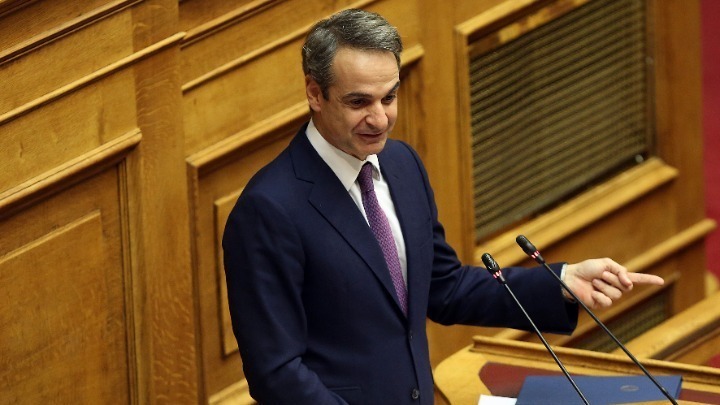PM Mitsotakis: Plenary allowing diaspora Greeks to vote a historic session

Article 8 of the constitution allowing Greeks abroad to exercise their voting rights from their place of residence "took 44 years and 8 months to become legislation," Prime Minister Kyriakos Mitsotakis said in parliament during a plenary discussion on Wednesday, "and looks like it will pass with great support across parties."
"I am proud that this is happening on New Democracy's (ND) initiative and with great inter-party consensus. I am sure it could have been achieved earlier if the previous parliamentary majority had chosen to pass a bill on it," he said, noting that ND had tabled a legislative proposal twice but they were never discussed.
"This peculiar hurdle in how Greeks abroad keep contact with their homeland has been an institutional stigma," and this, he added, was happening "in a country which established universal suffrage since 1864 and adheres to the principle of declared confidence in parliament since 1875."
Mitsotakis added that Wednesday's plenary session "could be described as literally historic, because it responds to both a long-standing demand and a current call," and represented a reform supported by over two-thirds of the MPs.
"We are not speaking about an additional right" to Greeks abroad, he clarified, "but to facilitate those registered on voter rolls; this, at the end, was the only realistic and applicable solution," he said of the bill, "otherwise we would not have taken a significant step forward, but retreated two steps back."
Speaking of the opposition parties, he called on MeRA25 leader Yanis Varoufakis to reconsider and vote for the bill. He also said that ND's and KINAL's initial proposal was more generous to Greeks abroad, but said that his government "had an obligation to show flexibility."
The prime minister explained that the law's provisions can be summarized in four key points of the article under vote:
- First, it ensures the votes of Greeks abroad are counted in the overall votes aggregate in elections carried out in Greece.
- Second, it gives the right to Greeks abroad to set up constituencies with a minimum of 40 voters.
- Third, the number of state deputies increases to 15 from the current 12; 3 of them will be included in the overseas electoral rolls, and one will feature at the top of party tickets in Greece (a proposal by KINAL leader Fofi Gennimata).
- Fourth, it accepts two conditions set by SYRIZA and the Greek Communist Party in order to vote for the bill, namely that Greeks abroad who can vote from their permanent place of residence abroad must have lived in Greece for at least two years in the last 35 years and be tax-active in the year of the vote.
"This bill is a democratic victory," said Mitsotakis, "as it effectively broadens the right to vote," and he also stressed that the mere costs of coming to Greece to vote is the reason for "the exclusion of many Greeks abroad from their participation in the election process."
The prime minister spoke of the law on the voting rights of diaspora Greeks as a democratic and parliamentary victory and also a victory of national proportions.
"It unites the Greeks of the world with their homeland (...) and rekindles their interest in their home country," said Mitsotakis and hailed the "interparty dialogue, a victory of parliamentarism and a model of consent and political agreement."

